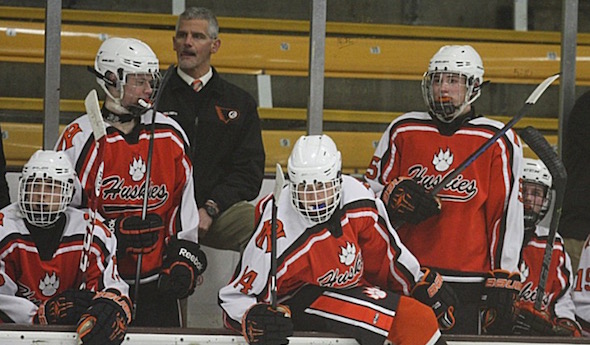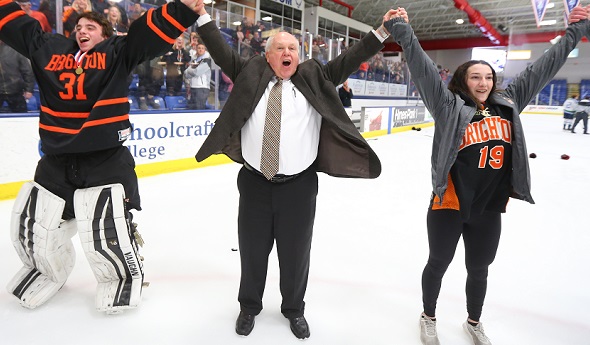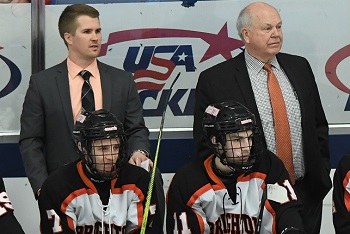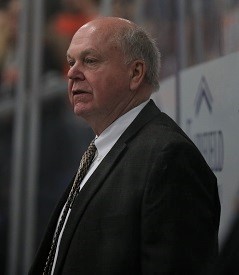
Veteran Coach, Huskies Eye Comeback
By
Pam Shebest
Special for MHSAA.com
December 21, 2015
PORTAGE — Although his hockey team skidded to the worst start during his 30-year coaching career, JD Kalleward and his Portage Northern Huskies still have that positive vibe going.
 “We don’t want to keep losing,” senior co-captain Jack Budnick said last week after the team opened 0-7. “We want to turn it around as soon as we can.
“We don’t want to keep losing,” senior co-captain Jack Budnick said last week after the team opened 0-7. “We want to turn it around as soon as we can.
“We’ve had a lot of close games where it’s just come down to a couple mistakes, and we’re working on them in practice.”
Portage Northern closed the 2015 portion of this season's schedule with its first win, 4-2 over Manistee on Friday, to move to 1-8 heading into the new year. And Kalleward is one reason the players are staying positive and focused, said senior co-captain Austin Killman.
“He’s been very vehement about hockey,” Killman said. “If he sees anybody slacking in practice, he’ll get them going.
“He’s been around the game for so long that he knows a lot about hockey and what systems will work in different situations. I have a lot of faith in his style.”
Kalleward said he honed his coaching style while working as an assistant to Art Missias, who passed away from cancer in 2010.
A netminder, Kalleward graduated from Northern in 1980. During his high school years, he helped coach goalies for his uncle, John Kalleward, Sr., and Missias with their squirt and peewee house teams.
It didn’t take long for JD to catch the coaching bug.


 When Missias took over the head coaching job at Portage Northern 30 years ago, he tapped JD Kalleward to be his assistant. Thirteen years ago when Missias retired, Kalleward took his mentor’s place.
When Missias took over the head coaching job at Portage Northern 30 years ago, he tapped JD Kalleward to be his assistant. Thirteen years ago when Missias retired, Kalleward took his mentor’s place.
One of the lessons learned from Missias is helping Kalleward deal with his team’s record so far this year: “You may have a down game, but it’s just one game.
“You’ve got to move on, learn from your mistakes and take the positives from it. Try and hope in the next game you do better.”
After losing nine seniors to graduation from a team that went 18-9-0 overall, 8-2 in the Southwest Michigan High School Hockey League last season, Kalleward knew this would be a rebuilding season. But he didn’t expect such a challenging start, including 0-2 in the league.
“Six of our (first) seven games have been on the road against very good programs including Traverse City, Forest Hills, East Kentwood, so we’ve had some pretty stiff competition,” Kalleward said.
Besides Budnick and Killman, the Huskies have just two other seniors: forward Scott Verduzco and goalie Tim Fitzgerald.
Scoring other successes
Although the Huskies have struggled early on the ice, Kalleward is most proud of their academic performance.
In his 13 years as head coach, his team has earned academic all-state every season.
“The last two years we were the top academic team out of 160 hockey teams in Michigan,” he said. “Two years ago, our team’s (grade-point average) was 3.94. Last year, it was 3.96
‘We have a number of kids who are academically gifted. Of the nine who graduated last year, we had just one beneath a 3.0; the other eight were above 3.5.”
Last season, Joe Mancina, with a 4.65 GPA, became the Huskies’ third top state scholar athlete in the last six years, as measured by grade-point average.
 One main reason Kalleward stresses academics is, “quite frankly, there aren’t too many who are going to sign NHL contracts,” he said. “We know that life after high school means doing well.
One main reason Kalleward stresses academics is, “quite frankly, there aren’t too many who are going to sign NHL contracts,” he said. “We know that life after high school means doing well.
“Every Thursday we meet with the players after practice to talk about where they are at school, their grades. We offer tutoring with those who are struggling.”
Over the last 30 years, Kalleward has seen several changes to both the game and the players.
“Relative to talent, you used to have a lot more kids going the route of playing high school,” he said. “Now they have so many options for players depending on what they want to do with their hockey careers.”
He also said players don’t seem as independent as they were in past years.
“What we find is sometimes it’s hard for kids to make their own decisions or make good decisions on their own,” he said. “As a coach, besides the X’s and O’s, we try to help them with that.”
As an assistant coach, Kalleward took note of what worked especially well and wrote a manual of expectations for coaches, parents and players that he distributes every season.
“We have an agreement signed by both parents and players saying they’ve read and understood the 16 points of emphasis, everything in the agreement: ice time, player behavior on the ice, behavior off the ice, academics, and so on,” he said.
Among team requirements are wearing khakis, a shirt and tie when going to games, “The same apparel they’d wear for a job interview,” he said.
“We eat together quite a bit and have rules on behavior. There’s probably a good three pages of rules.”
Turnaround time
Killman said it’s up to the captains to help turn the team around.
“You have to get your guys motivated for games, and if they’re getting down on themselves, try to get them back up,” he said. “If they’re coming to practice slacking, you’ve got to push them.
 “(Being captain) gives me more responsibility and I love responsibility.”
“(Being captain) gives me more responsibility and I love responsibility.”
Budnick said Killman is one spark on the team.
“Out on the ice before we go to opening faceoff, we gather around the net and we talk about the key aspects that we want to work on in the game,” Budnick said. “Austin is always taking the responsibility and says exactly what we need to do.
“Austin is definitely the hardest worker on the team, and that’s a great leadership quality from my perspective. It pushes everybody else.”
Kalleward’s three assistants include two Portage Northern alums. Steve Stanley, who works with the forwards, graduated in 1983, and Ken Rogers, who works with the defense, in 1975.
Tom Askey, who played pro hockey, including with the NHL Anaheim Mighty Ducks in 1997-98 and the then-United Hockey League Kalamazoo Wings in 2006-07, works with the goalies.
In 1975, the Huskies made it to the Tier II MHSAA Final before losing to Lansing Catholic Central. They made at least the Semifinals four times under Missias.
In spite of this year’s start, the future looks promising for the Huskies with four juniors, 10 sophomores and two freshmen mixing with the senior leaders.
Juniors are forwards Spencer Brown, Andrew Fitzgerald, Jesse Liebert and defenseman Calvin Voss.
Sophomores are forwards Grant Ernst, Mason Seiferlein, Tyler Simon; blueliners Griffin McLoed, Roarke Ross, Leon Fieber, Dakota Meadmore; two-way players Will Todd, Caleb Martin and goalie Zach Bossch.
The freshmen are forwards Zonjic Singleton-Julian and Connor Sorge.
Northern picks back up this season’s schedule Jan. 2 against Okemos.
 Pam Shebest served as a sportswriter at the Kalamazoo Gazette from 1985-2009 after 11 years part-time with the Gazette while teaching French and English at White Pigeon High School. She continues to freelance for MLive.com covering mainly Kalamazoo Wings hockey and can be reached at [email protected] with story ideas for Calhoun, Kalamazoo and Van Buren counties.
Pam Shebest served as a sportswriter at the Kalamazoo Gazette from 1985-2009 after 11 years part-time with the Gazette while teaching French and English at White Pigeon High School. She continues to freelance for MLive.com covering mainly Kalamazoo Wings hockey and can be reached at [email protected] with story ideas for Calhoun, Kalamazoo and Van Buren counties.
PHOTOS: (Top) Coach JD Kalleward has spent 30 seasons behind the Portage Northern bench. (Middle) Joe Mancina, center, was last season's top state academic athlete with a 4.65 GPA. He is joined by, from left, all-state team selection Mitchell Kalleward, former NHL player Mike Knuble, Northern all-stater Matty Seiferlien and Coach JD Kalleward. (Below) The Huskies' locker room door. (Head shots) From left: JD Kalleward, Jack Budnick and Austin Killman. (Top two photos courtesy of JD Kalleward; bottom photo and head shots by Pam Shebest.)

Brighton Coach's Impact 'Immeasurable'
By
Tim Robinson
Special for MHSAA.com
October 7, 2020
By Tim Robinson
Special for Second Half
Paul Moggach has never been much for looking back.
 And as he begins his first season away from the Brighton hockey program in more than three decades, he’s still looking ahead.
And as he begins his first season away from the Brighton hockey program in more than three decades, he’s still looking ahead.
“I’m thinking about what I’m going to miss more than the mark I left,” he said in a phone conversation last week. “I guess I enjoyed so much of the time I had, the opportunity to coach at Brighton, I’m thinking more how I fill the time and the things I'll miss.”
Moggach (pronounced MUG-uth) retired as Brighton’s coach this past summer after 25 seasons and having led five teams to MHSAA Division 1 championships. He compiled a record of 466-172-47 during that period.
But that’s not what he remembers most, nor why he wants people to remember him.
“I would like them to remember the teams and players who played for me and my assistants, more than me,” Moggach said. “We have so many blessings and opportunities in our lives, and hockey was one for me and hopefully for the players and assistants I worked with.”
One of those assistants was Kurt Kivisto, who joined the Bulldogs originally as a team manager more than 20 years ago and was a player at Brighton. He eventually won a national championship at Michigan State before rejoining the program as an assistant coach a decade ago.
“The No. 1 thing I’ll take from him is sticking by your beliefs and not sacrificing those beliefs for the team,” said Kivisto, who was named Moggach’s successor in September. “He sticks by those beliefs and ... he’s not willing to sacrifice that even if it could hurt the team. The character and integrity he has, how he treats people with fairness and what he believes is right is the biggest thing I’ll take.”
A stepson, Damon Whitten, played for Moggach at Brighton and at MSU before becoming an assistant coach and eventually the head coach at Lake Superior State, where he is in his eighth season.
Asked about Moggach’s impact at Brighton, Whitten said, “I’m not sure you can measure it. Your mind goes to the hockey players who have come to Brighton, and that’s a big part. But I think it goes beyond that. The money they’ve raised over the years for different families in need, for example. He’s had a big impact, and the players he had were a big part of that, but it goes well beyond that, and he did it the right way. Thirty-plus years (in the program), and I’m not sure you can count more than a handful of times where he made a bad decision or handled things poorly. He did things the right way, every day, all of the time, and I think it’s why he was so successful for so long.”
 The team’s charitable works were mostly kept under the radar – Moggach’s reasoning being his players had been given much, it was their turn to give back, and he didn’t want people thinking they did those things for publicity.
The team’s charitable works were mostly kept under the radar – Moggach’s reasoning being his players had been given much, it was their turn to give back, and he didn’t want people thinking they did those things for publicity.
Moggach joined Rick Bourbonais as an assistant at Brighton in the mid-1980s, then switched roles with him for the 1996-97 season.
He realized Brighton’s potential in the 1992-93 season, when the Bulldogs upset perennial state power Trenton in the Class A Quarterfinals before losing to Detroit Catholic Central in a Semifinal.
“That, to me, said, at least in my mind, that we can do this,” Moggach said. “It’s not impossible.”
He slowly began to build the program, getting good players and a schedule that would challenge them.
“You get the players by building a good culture,” he said. “Back in the day, when I started, we weren’t very disciplined and our league wasn’t very disciplined. So I think we realized we had to build that, and I could have an influence on building that in Brighton.”
Along with the culture, Moggach looked for an edge whenever he could find it. He was talked into making a trip to the Keweenaw Peninsula by one of his player’s parents, and found enormous benefits for his team, both competitively and in team bonding.
“It’s a lot about the little things we do,” he said, “that we find joy in, and create those opportunities. Creating the little moments really can build to bigger moments. We played capture the flag one day in about two feet of snow.
“Almost killed them,” he added, chuckling. The exhausted players didn’t have much left for the game that night, but spending time together for four days in a bus and hotel room always brought the team closer on and off the ice.
That first UP expedition also led to more teams making the trip, for team bonding and a glimpse of a part of the state, and themselves, they might never have seen otherwise.
“We didn’t do that for long,” he said. “But we always came back saying we were better together because of that experience.”
Bob Nelson had three sons play for Moggach, and Nelson’s wife, Kris, was president of the team’s booster club during their involvement over nearly a decade in Brighton hockey. Nelson also coached the program’s younger players for five seasons.
“We got to know the Moggachs really well,” he said. “It was a good experience, both as a coach and as a parent as well.”
Moggach introduced other things, including an emphasis on nutrition and off-ice training, that players resisted at first until they saw the benefits.
 He savored conversations with referees and opposing coaches before the games and even the occasional reporter after games.
He savored conversations with referees and opposing coaches before the games and even the occasional reporter after games.
But his first priority was the players. At times he would erupt in practice at a player or, more commonly, the team, and the boys soon learned to hear the message, not the volume. But for a couple of seasons, they also wrote some of his wilder statements down in a notebook after practice.
One year, they read some of them at the banquet, and after each one, Moggach’s wife, Sharon, would look at him and ask, “Did you really say that?”
Moggach would laugh and confess to remembering he had actually done so, then laughing.
“He knew part of what made the program good was his relationship to the players,” Nelson said. “If it was a good time, he wanted to enjoy it, even at his own expense at times.”
Moggach has staying in the background this offseason, letting Kivisto shape the team.
Asked if he were willing to fully switch coaching roles, as he and Bourbonais did a quarter-century ago, Moggach laughed.
“No,” he said emphatically. “Rick wasn’t in his 70s when we made the switch. Kurt needs his time. I’ll be there if he needs me.”
Moggach, who is 74, still works fulltime as the University of Michigan’s director of risk management.
He plans to spend more time with his wife and watch his grandsons play hockey, as well as catching some Lake Superior State games.
“I was really blessed to have Rick and Brownie (longtime assistant Mike Brown) along for the ride, and then to get Kurt involved,” Moggach said. “They weren’t the only ones, but they were the kids for me.
“The other thing is the support from the Brighton (High School) administration, the teachers, and our community. There are more people to thank than I could ever bring up. I do think that, all together, it was a great run. It couldn’t have been any better.”
PHOTOS: (Top) Recently-retired Brighton hockey coach Paul Moggach celebrates the 2018 Division 1 championship game win over Saginaw Heritage at USA Hockey Arena. (Middle) Former player Kurt Kivisto, left of Moggach during the 2018 Semifinal win over Detroit Catholic Central, served as an assistant before assuming the head coaching job in September. (Below) Brighton's 2018 championship was its fifth under Moggach. (Photos by Hockey Weekly Action Photos.)

